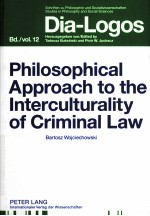

PHILOSOPHICAL APPROACH TO THE INTERCULTURALITY OF CRIMINAL LAWPDF电子书下载
- 电子书积分:12 积分如何计算积分?
- 作 者:BARTOSZ WOJCIECHOWSKI
- 出 版 社:PETER LANG
- 出版年份:2010
- ISBN:3631605854
- 页数:312 页
Gratitude 7
Introduction 9
Chapter Ⅰ.The idea of pluralism and human rights in democratic multi-cultural societies 19
1.Between the Scylla and Charibdis of cultural relativism 19
2.Cosmopolitanism: The philosophy of world citizenship 25
3.Ronald Dworkin’s right of equal treatment as the basis of liberal plu-ralistic society 32
4.Human rights as the nature of intercultural consensus 38
4.1.Human rights - the creation of "Western" imperialism? 39
4.2.Human dignity as the basis of human rights 45
5.Democracy in the globalization age 52
5.1.Democracy in the 21st century 52
5.2.Are democracy and human rights compatible? 60
Chapter Ⅱ.Discursive - ethical justification of human rights and democracy 64
1.The Ethics of Discourse in Karl-Otto Apel’s Transcendental-Pragmatic Philosophy 64
1.1.The basis of discourse ethics 65
1.2.Universalistic ethics of co-responsibility 69
2.Jurgen Habermas’ theory of discursive reconstruction of law 80
2.1.The role of procedural communicative rationality in justification of law 81
2.2.Communicative reinforcement of democracy - deliberative policy 90
3.Main assumptions of Robert Alexy’s legal argumentation 103
3.1.The theory of discourse and human rights in Alexy’s philosophy of law 105
3.2.Direct and indirect patterns of discursive justification of human rights 110
4.Critical character of discourse theory 119
Chapter Ⅲ.The principle of mutual recognition as a condition of inter-cultural legal discourse 121
1.Philosophical roots of the theory of recognition 121
1.1.Interpersonal character of human relations in Fichte’s idea of law 121
1.2.Mutual recognition in Hegel’s philosophy of law 125
2.General assumptions of the modern theory of recognition 132
3.Patterns of intersubjective recognition: Axel Honneth’s moral grammar of social conflicts 136
3.1.Love and the fight for recognition 136
3.2.The fight for recognition in the sphere of modem law 138
3.3.The role of social respect in shaping mutual recognition 147
3.4.The principle of mutual recognition and the rules of discourse as constitutive elements for political and legal constructivist com-munity 152
Chapter Ⅳ.Punishing as a negative reaction to illegal acts 175
1.The notion and justification of punishment in an inclusive constructivist community 175
1.1.Constmctivist community as an exponent of the openness of de-mocratic society 176
1.2.Punishment as a manifestation of standard social practice 183
2.Double justification of punishment in Hegel’s philosophy of law 188
2.1.Argument from one’s right 189
2.2.Argument from the relation of mutual recognition 191
3.Participation in communicative activities and responsibility 196
4.The protection of interaction processes in the light of criminal law 199
5.Changing roles between the victim and the offender, and the justification of punishment 207
6.Relation of criminal law to morality 214
Chapter Ⅴ.Punishing as a condition of maintaining social balance 226
1.Punishment as the restoration of balance 226
2.Public reaction to the evil in the form of condemning the offender 235
3.Punishment as a means of restoring the relation of mutual recognition 243
3.1.Penal consequences of infringing the principle of mutual recognition 244
3.2.Is the act of committing a crime a condition to exclude an offender from the community? 249
4.Punishment as a message for society 264
5.Interculturaland international penal law 266
5.1.Notional relation of "intercultural" and "international" law 268
5.2.The idea of the "end of impunity" 277
Conclusion 284
Literature 293
- 《线性代数问题详解》(美)朗(Lang,Serge)原著;刘建勋译著 1992
- 《Linux应用程序开发 第2版》(美)Michael K. Johnson,(美)Erik W. Troan著;武延军,郭松柳译 2005
- 《Java程序设计案例教程》潘艺,王丽红主编;罗亚东,范颖副主编;李鑫,刘一臻,贾晓飞编写;王泽邦主审 2015
- 《Java程序设计实用教程》曲翠玉,邢智毅主编;钱爱玲,王保成,陶骏副主编 2014
- 《Language Policy and Language Conflict in Afghanistan and Its Neighbors:The Changing Politics of Lang》Schiffman 2011
- 《EXECUTIVE HARRY LEVINSON WITH THE ASSISTANCE OF CYNTHIA LANG》 1981
- 《TRANSITIONS TO SUSTAINABLE DEVELOPMENT:NEW DIRECTIONS IN THE STUDY OF LANG TERM TRANSFORMATIVE CHANG》 2010
- 《AMSTERDAM CLASSICS IN LINGUISTICS 18 INVESTIGATION OF THE ORIGIN OF THE OLD NORSE OR ICELANDIC LANG》NIELS EGE FRANS GREGERSEN 2013
- 《疯狂Java讲义》李刚编著 2012
- 《世界贸易法律和新自由主义 重塑全球经济秩序》(英)安德鲁·朗(ANDREWLANG)著;王缙凌,樊健译 2016
